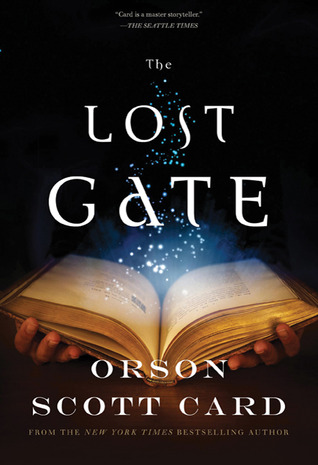
Actual footage of me reading The Lost Gate:

There was a lot to like about this book. Magical portal. Norse gods. A found family. A grey antagonist.
And yet …
An arrogant protagonist. Some really weird (and completely unnecessary) sex/nudity/assault scenes. Exposition. (Exposition everywhere.) And a plot that just … doesn’t.
The thought occurred to me half-way through this book that I don’t read a lot of male authors. Really. I’ve read about 60 books this year, and about 120 last year. Not counting academic texts, I’ve only read 18 male authors (vs. 60 female). Of those, only two — Orson Scott Card with The Lost Gate and Brandon Sanderson with Mistborn (currently on hold) — are what I would consider old-school-style-male-fantasy-writers.
Perhaps I simply haven’t had enough exposure to male fantasy authors. A sample size of two is hardly representative. But, I will nonetheless say this. These books are difficult. Difficult for a lot of reasons. Their structure. Their pacing. Their characterizations. Their language. (Heck, parts of The Lost Gate felt like reading the Bible.) And, partly because aspects of the book I just couldn’t relate to. It felt … well, it felt male.
Perhaps with all the social dialogue going about right now, I’m just biased in my reading and impression. Or, maybe they were male, — male author, and male protagonists. Perhaps my experience with The Lost Gate is what men feel like when they read An Enchantment of Ravens or House of Earth and Blood.
I don’t see an inherent issue with books being targeted toward a particular sex/gender … though, there’s room for a larger social dialogue on how we treat these books and perceive their authors. And, it makes sense that a more-male-focused book would feature aspects that I just don’t get … there’s a huge body of research working to understand sex/gender differences — and, research in embodied cognition reminds us that our bodies play a fundamental role in our perception.
Which, TLDR essentially translates to “I’m not surprised.”
… but it was still weird.
On the more ha-ha / *cringe* side … This is a excerpt from from Haruki Murakami … which, I think, quite brilliantly illustrates the phenomenon:


What’s it about?
 We’re here to talk about books. Aren’t we?
We’re here to talk about books. Aren’t we?
Danny North is a Norse god … sort of.
Thousands of years ago, the gods got their power from walking through magical gateways. But, 1300 years ago, the trickster Loki closed the gates.
Without their source of power, the families have been fading. Danny is the most recent example: born tot he two most powerful mages of his generation, he’s completely powerless.
… or, so he thinks.
At age 13, Danny realizes that he’s a gate mage. Which should be a cause for celebration, except — due to mutual agreements between the Norse pantheon and other families — means that Danny’s life is danger. Thou shalt not suffer a gate mage to live — and all that good stuff.
Danny flees his home; bumps into the wrong crowd; meets some teachers; and then … Well, the book essentially ends.
I guess that’s why there’s a sequel.
Things I liked:
Wad’s story. Technically the antagonist … but Wad was much more interesting than Danny. I loved his chapters.
The concept. It was good. A bit cliché, for sure — especially given the Thor movies — but solid, entertaining, and engaging. I do want to find out what happens next.
What I didn’t like:
The pacing. It just … didn’t go anywhere. There was no rise in emotional intensity — no increase in the stakes. The plot plods along slowly, with enough action to keep you engaged but not enough to feel like it was building toward something. And then, after this rather meh – OK, I guess this might be the start of something interesting magical event … it’s over. Just like that.
The writing. Maybe it works better in text vs. audiobook … but, lord above, parts of this felt like sitting through a Sunday sermon. Lots of “he spilled his seed upon her belly” and “the voice of God was in the whirlwind” and
He sat upon the hill, a Gatefather who was now but a shadow of himself, and wept. For all his crimes he wept, for all who had died before he could save them, for the mages he had stripped of power even more utterly than he had been stripped today.
^^ OK. Fine. This scene was heartbreaking.
… which were juxtaposed against gems like: “Might-have-beens are a bitch.”
I also struggled with flow. The story jumps around a lot, so that — if i stopped listening for even a few seconds — huge changes in setting / characters / conversations might have occurred … most with poor bridges, making it difficult to follow. There was lots of rewinding.
The nakedness and frequent unnecessary references to pedophilia. I am so uncomfortable. So, so uncomfortable. And these references added absolutely nothing to the story.
Danny. Not a sympathetic protagonist — not in the least. Sure, the kid had a rough childhood … but he was also arrogant and annoying. The rationale? “Well, I’m a gate mage, and gate mages are supposed to be tricksters.” Except (1) I don’t by the biological determinism sob story, and (2) nothing he did was tricky or mischevious — it was silly and immature.
So. much. exposition. I swear. Gates are explained like fifty times
Final thoughts:
The Lost Gate was an interesting enough story, and I’ve already checked out the next book — The Gate Thief — from the library. However, its potential brilliance is dampened by relatively significant structural issues. Perhaps it’s best summarized as:

The Details:
- The Book: The Lost Gate by Orson Scott Card
- Published: 2011, Tor
- My Copy: VIRL
- Read date: June 9-12, 2020
- Rating/5:
Thanks for this. It’s funny, b/c I just put up an interview by Orson Scott Card. I love the way he speaks in the interview, but that doesn’t mean I would love his books.
Andrew Klavan (a male noir/fantasy writer) has said that men tend to be interested in things and women in relationships. So, a male writer is more likely to include long passages about how to rebuild a jeep or how the anti-gravity works, and this will actually interest male readers. I did notice this when I tried to read Foundation by Isaac Asimov, which is generally agreed to be this amazing work of sci-fi, but the problem was that in the first few chapters the generations were flying by, so I couldn’t figure out which character to identify with because they would get a couple of paragraphs and then die.
Also I laughed out loud at the excerpt. Yes, definitely if my female friends died what I would miss would be their breasts! What???
He did the afterward of the audiobook, and definitely has a very distinctive way of speaking. He was super mellow.
I can /totally/ see that trend — things vs. relationships — when I compare the male/female SFF books that I’ve read. It’s actually a rather stark divide, when you put it that way.
Ha! The favourite part of my friend’s personalities are their breasts. So special. Much round.
Amazing funny and honest review Em!!!!!!!
Thanks, Sophie!! 🙂
That’s so funny, because I LOVE Orson Scott Card’s writing, but I totally see what you mean. It’s 100% different from female SF/F authors. I just think his writing is very matter-of-fact, which works for me. This book sounds weird, though. Like he was reading lots of Neil Gaiman and decided to give that a try… Maybe he should have stuck to space?
I’m so glad I’m not the only one who feels this way! I’m half way through Book #2 at the moment, and it’s going better … I think I’m starting to get used to the matter-of-factness. (There’s also lots less exposition!)
Neil Gaiman is a possible influence. Also possibly the Thor movies … He does make reference to the MCU at a few points.
Is there one of his books that you’d recommend as a must-read?!
Ender’s Game is one of my all-time favorite SciFi books. Actually, I like Ender’s Shadow better, but to fully appreciate it you have to read and love Ender’s Game first.
I’ll put it on my list! Did you watch the movie? Did you like it?
The movie was okay. Though honestly half of what makes the book good is that you don’t know the ending. Ender’s Shadow is the same story from another character’s POV and is just brilliant.
Noted! Book first, then movie!